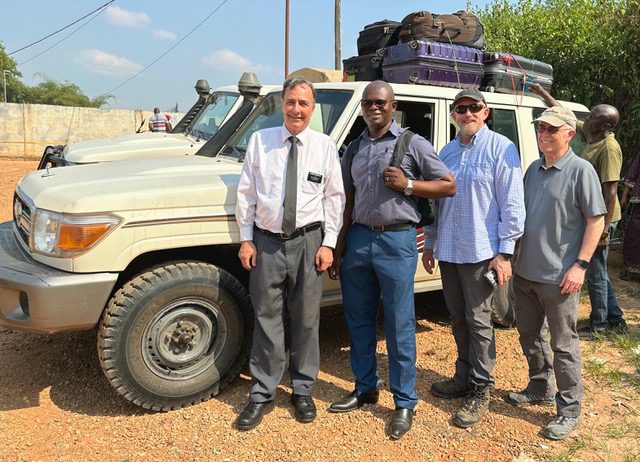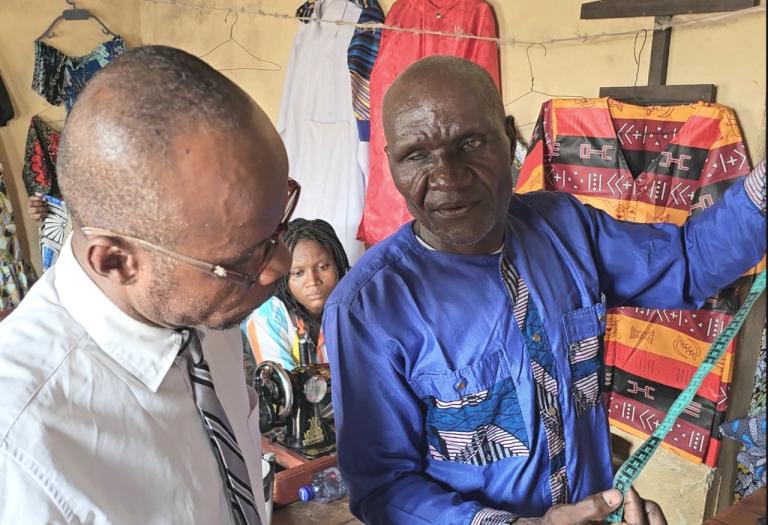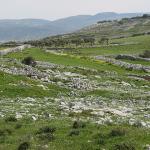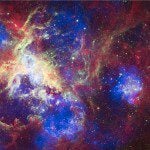
From left to right, Jeffrey Mark Bradshaw, Elder Willy Sabwe Binene (since October 2022, an Area Authority Seventy), James G. Jordan, Russell M. Richins, and, in the background, their driver, Leon.
This review essay, written by Jeff Lindsay, just went up on the blog of the Interpreter Foundation: “Brent J. Schmidt’s Relational Faith: An Essential Book for Understanding the New Testament Meaning of “Faith” and for Better Appreciating the Beauty of the Restoration”
As did this archived recording of our weekly AM radio program: Interpreter Radio Show — May 7, 2023
In the 7 May 2023 episode of the Interpreter Radio Show, Terry Hutchinson, Spencer Kraus, Hales Swift, and Brent Schmidt discussed Come, Follow Me New Testament lesson 23, the windows in Jaredite barges, and the recent BYU New Testament Commentary Conference. Their discussion has now been edited to remove commercial breaks, archived, and posted for your listening convenience
The “New Testament in Context” portion of this show, for the Come, Follow Me New Testament lesson 23, “In Remembrance” covering Matthew 26, Mark 14, and John 13 will also be posted on Tuesday, May 30.
The Interpreter Radio Show can be heard live on Sunday evenings from 7 to 9 PM (MDT), on K-TALK, AM 1640, or you can listen live on the Internet at ktalkmedia.com.

I’ll share here some notes from Michael Guillen, Believing is Seeing: A Physicist Explains How Science Shattered His Atheism and Revealed the Necessity of Faith (Carol Stream, IL: Tyndale Refresh, 2021):
According to the Pew Research Center, about 18 percent of American Atheists believe in a “higher power.” And 31 percent of American Atheists say they “often feel a deep sense of spiritual power and well-being.” (191)
In 2007, neuroscientist and popular Atheist Sam Harris caught flak from many attendees of the Atheist Alliance conference in Washington, DC, when he delivered a speech titled “The Problem with Atheism.”
One problem with atheism . . . is that it seems more or less synonymous with not being interested in what someone like the Buddha or Jesus may have actually experienced. In fact, many atheists reject such experiences out of hand, as either impossible, or if possible, not worth wanting. . . .
“As atheists, our neglect of this area of human experience puts us at a rhetorical disadvantage. Because millions of people have had these experiences, and many millions more have had glimpses of them, and we, as atheists, ignore such phenomena, almost in principle, because of their religious associations — and yet these experiences often constitute the most important and transformative moments in a person’s life. Not recognizing that such experiences are possible or important can make us appear less wise even than our craziest religious opponents.”
Ouch.
In 2o14, Harris wrote a book called Waking Up: A Guide to Spirituality without Religion, in which he doubles down on his critique of Atheism’s small-mindedness. Here’s the publisher’s summary of Harris’s basic thesis:
“Waking Up is for the twenty percent of Americans who follow no religion but who suspect that important truths can be found in the experiences of such figures as Jesus, Buddha, Lao Tzu, Rumi, and the other saints and sages of history. Throughout this book, Harris argues that there is more to understanding reality than science and secular culture generally allow.” (192-193)
It’s interesting that Harris — once, at least, one of the most prominent among what were known as the “New Atheists” (Sam Harris, Richard Dawkins, Daniel Dennett, and the late Christopher Hitchens, were sometimes dubbed the “Four Horsemen” of the movement) — took a notably and controversially accepting attitude toward “extrasensory perception” (ESP) or “psychic phenomena” or psi on page 41 of his 2004 bestseller The End of Faith: Religion, Terror, and the Future of Reason, acknowledging “a body of data attesting to the reality of psychic phenomena, much of which has been ignored by mainstream science.” He goes on to observe that
“The dictum that ‘extraordinary claims require extraordinary evidence’ remains a reasonable guide in these areas, but this does not mean that the universe isn’t far stranger than many of us suppose. It is important to realize that a healthy, scientific skepticism is compatible with a fundamental openness of mind.” (The End of Faith, 41)
Now, I should be clear that I don’t regard psi , if it exists, as a matter of religion — and I’m guessing that Sam Harris doesn’t, either. If it exists at all (and I’m currently somewhat inclined because of the same data to which Harris alludes, to think that it probably does, though typically at a very low level of intensity, efficiency, or effectiveness), it’s probably a natural power of the mind. However, it if exists at all it also seems to me pretty conclusive evidence that materialism or naturalism as it’s typically conceived is incorrect.

Here are three responses to Sunday evening’s CBS Sixty Minutes “exposé” on the financial holdings of the Church of Jesus Christ of Latter-day Saints:
- The Church of Jesus Christ of Latter-day Saints: “Statement Issued Following CBS ‘60 Minutes’ Report: Church moves forward ‘consistent with the gospel of Jesus Christ’”
- “Bishop Christopher Waddell defends the Mormon church’s handling of its vast holdings”
- Tad Walch, for the Deseret News: “In CBS’s ‘60 Minutes’ segment on church finances, it missed the sweeping rags-to-riches history of faith: That history helps explain the church’s finances and decision-making today”
- Kirk Magleby, for Book of Mormon Central: “Church Finances: A View from the Pews”
In this context, I can’t help but be reminded of the devotional address given by Elder Shayne M. Bowen at Brigham Young University back in 2018: “I Can Sleep When the Wind Blows”
I’m reminded, too, of a story about President Heber J. Grant’s call to the apostleship. He received a letter shortly thereafter from a business acquaintance in (if I remember correctly) San Francisco. This man wrote saying, effectively, that he had always supposed that the leaders of the Mormon Church were scoundrels. Now that Elder Grant was among them, though, he realized that he owed them all an apology, because he knew that Heber J. Grant, a man whose integrity he knew and respected, would never be part of such a thing.

I close, as I often do, with some infuriating items from the Christopher Hitchens Memorial “How Religion Poisons Everything” File™:
“Latter-day Saints Continue to Provide Earthquake Relief in Türkiye and Syria”













